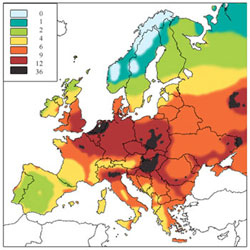Per-day insurance and cognitive dissonance
The Italian insurer Sara offers a product called Sarafree. It is a form of car insurance that has to be activated (by sms) by the driver the day before he or she wants coverage, ie before the car will be used. A nice idea for those that seldom drive.
It has a feature which appeals to people trying to influence mobility behaviour: it forces people to re-enter a kind of decision process, instead of sticking with a decision they made earlier. The phenomenon is a form of cognitive dissonance, I was told yesterday, and it entails the way people look at past decisions.
For example, if two otherwise equal persons with the same mobility 'demand' make different decisions (say, one decides to buy a car and the other decides not to), and you ask the car-owner about his or her experiences, he or she might say: well, I sure am glad I bought that car. The buses are just too crowded and smelly for me. The non-car owner might say: I enjoy not having to be attentive to the traffic all the time, I love to prepare things for work while on the move, etcetera.
Of course, there is some truth to both statements. But it is unlikely to be the whole truth about how they really feel, part of it is justification for a decision taken in the past. It is a process thought to make people feel a little happier about themselves, and about the decisions they made. Also, if we constantly had to re-enter all kinds of decision processes in general, normal life would grind to a halt. Partly, that is where things like habits come from.
The point is that the car owner, having once made his decision to own one, will not easily re-enter the decision process leading to using the car yes or no, because he or she has paid a lot of fixed costs for it, and will no longer consciously weigh alternative options.
Some critics of the PAYD idea make that same point. They say: it's not only a financial issue. If PAYD is introduced and people will be charged or credited according to mileage once a year, their behaviour is not likely to change much, because yearly billing does not constitute a 'trigger' to enter the decision process what type of transport to use anew every time a trip is planned.
Sara's product seems to remedy that. The need to remember to insure your car every time you plan to use it looks like a perfect 'trigger'.
All in all, even when contemplating market-based measures or products to influence mobility behaviour, economical 'marginal analysis' alone is not enough. Behavioural analysis is needed also.
Information on SaraFree insurance can be obtained from: http://www.sara.it/ProdottoPres.asp?idProd=9
For those of us who, like me, are not proficient in Italian: go to freetranslation.com, copy and paste the aforementioned URL into the section 'free website translator' and read the info in, well, a kind of English.
Christof

